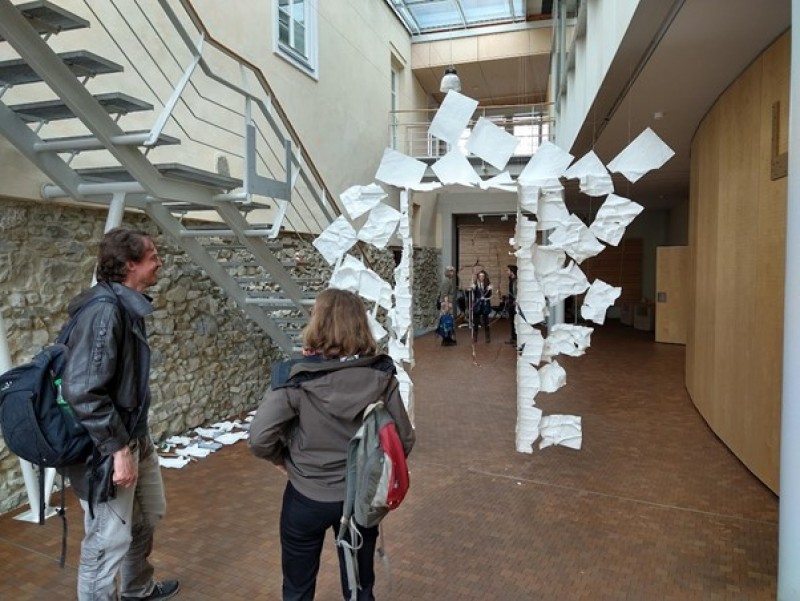News Details

Report by Raf Jansen
The "Evolutionary Theories for Social-Ecological Change" working group recently held its final session at the Konrad Lorenz Institute, following a previous visit to the institute in September. The group's objective was to explore the intersection between social-ecological systems research and evolutionary theory, and develop research projects that combine both frameworks, with the aims of advancing understanding of complex social-ecological change, and lay a foundation for future research.
The working group was comprised of two lead researchers, Prof. Tim Waring and Prof. Maja Schlüter, who were joined by participants Prof. Monique Borgerhoff Mulder, Dr. Thomas Currie, Dr. Laurel Fogarty, Dr. Peter Søgaard Jørgensen, Dr. Jamila Haider, and KLI director Dr. Guido Caniglia. Raf Jansen assisted in recording the group's activities and finalizing research outputs. Science journalist Tim Vernimmen joined the group to learn more about the different topics and their possible interplay.
As this was the last planned meeting for the working group, there was a sense of urgency to make it count. The team worked hard to identify new theoretical possibilities and design new models along the way. The group submitted a revision of their original integrative perspective paper and made new headway with a cultural evolutionary poverty trap model. Additionally, the group shared their research with KLI fellows and external researchers in a colloquium that took place on Thursday. Overall, the team made significant strides towards advancing research at the intersection of social-ecological systems and evolution theory.
17-04 Day 1

Everyone was glad to return to the beautiful KLI premises, which was now host to an installation from Kendall Baker, an in-house artist from the United States.

Prof. Tim Waring hit off the workshop by presenting a roadmap with a number of goals to accomplish during the week.

Participants followed up with presenting some of the work that they did related to the theme of integrating evolutionary theory and social-ecological systems thinking, and what they saw as interesting strands to pursue during the week.

The team was visited by KLI fellow Sonia E. Sultan, an evolutionary ecologist was has been a major contributor to the eco-devo concept.

The first day concluded with a cosy dinner at the KLI in which working group participants and KLI Fellows got a chance to meet each other and discuss their respective research.
18-04 Day 2

Participants often split up in focus groups to pursue specific issues. Here, Tom Currie and Peter Søgaard Jørgensen discussed final edits to the KLI perspective paper.

Most of the work happened in the main aula.

The KLI staff made sure that the workshop was well provided with a variety of snacks and beverages.

Amid all the serious discussions and theorising efforts there were plenty of light-hearted moments as well.
19-04 Day 3

The mornings started with a 20-minute commute to work from Wien Franz-Josefs-Bahnhof to Klosterneuburs, as most participants stayed in the city.

Jamila Haider was able to join the discussion in person from Wednesday. Here Jamila (right) joins in a discussion on the sources of innovation in social-ecological systems.

Another key discussion of the day was about the poverty trap model that Laurel Fogarty was building, which could serve as an example of how to integrate cultural evolution and SES research.

Guido Caniglia and Maja Schlüter worked on understanding innovation in systems thinking through evolutionary development of biology.
20-04 Day 4

Tim Waring and Monique Borgerhoff Mulder are discuss the design of a model of the global evolution of climate policy.

On Thursday, the group presented the fruits of their collaborations to local researchers and KLI fellows. The presentation was also attended by a number of online participants from all over the world.

After the presentations, the local participants settled outside where they could ask more in-depth questions to the workshop participants, while also enjoying the excellent spring weather.

This discussion session ended with a collective wrap-up where both participants and organisers reflected on what they had learned from their discussions.
21-04 Day 5

As the week drew to a close, it was time to reflect on collaborative effort as a whole, and make final plans for the future.

Jamila Haider, Maja Schlüter, Guido Caniglia and Tom Currie shared their reflections on the innovation-transformation model that they developed over the course of the week.

At the end of the day, the participants were given a tour of the art installations around the KLI by the artist himself, Kendall Baker.

The week concluded with beautiful spring walk to the mighty Donau river.

From left to right: Bottom row: Prof. Tim Waring, Dr. Guido Caniglia, Dr. Laurel Fogarty. Middle row: Prof. Maja Schlüter, Raf Jansen, Dr. Thomas Currie, Dr. Jamila Haider. Back row: Prof. Monique Borgerhoff Mulder, Dr. Peter Søgaard Jørgensen, Tim Vernimmen.

